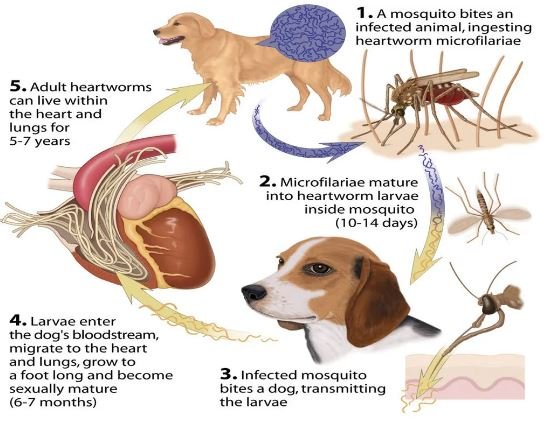April 2022
Submitted by: Brandi Rochon
Make Your Pet “Heart” to Get
As a responsible pet owner you should be well aware of the complications heartworm can cause in your animals. If you aren’t, today is a good time to learn! Heartworm is a serious and potentially fatal disease that affects pets worldwide.
The Transmission of Heartworm
Heartworm is spread from host to host by the bite of a mosquito. As if we needed another reason to dislike mosquitos! Mosquitoes bite infected animals and ingest the mosquito larvae living inside that animal. After 10-14 days inside a mosquito, the larvae develop into their infective stage. When a mosquito bites an uninfected animal (dog, cat, fox, coyote, wolf, ferret, etc) after this period, the larvae enter the new host through the bite wound. They grow at the original bite site and eventually disperse throughout the body to vital organs such as the heart, lungs, and blood vessels leading to those organs.
Signs of Heartworm Disease
Baby mosquitos develop into their infective stage six months after an animal has been bitten by an infected mosquito. Pets may show no signs or minimal signs after initial infection. Symptoms become more likely and potentially more severe the longer infection persists. Common signs of heartworm disease are a persistent cough, fatigue, weight loss and decreased appetite. Potentially deadly complications can arise as heartworms disperse throughout the body to vital organs. Heartworms make their way to the heart where they can cause heart failure. During heart failure, the belly will appear swollen from excess buildup of fluid in the abdomen. In cases with large numbers of heartworms the blood flow within the heart may be blocked leading to a life-threatening circumstance where you may notice pale gums and labored breathing.
Heartworm Testing
Testing your pet for heartworm should be part of your routine visit to your veterinarian. Your dog should be tested yearly and it is non-invasive, only requiring a small sample of blood. The test can be run the same day as your appointment and only takes eight minutes. Some clinics will send tests to a lab when time is not a concern. Every dog six months and older should have a heartworm test because it takes approximately six months for infected larvae to reach their infective stage and they are otherwise undetectable. Your pet must be tested every six months if not taking heartworm preventative the entire time. Heartworm testing should still be done yearly when on preventative to ensure that the prevention your dog is on is working effectively. Heartworm preventatives are highly effective but can allow breakthroughs where a dog may still become infected. Missing a dose, giving a dose late, or even giving a dose that the dog may spit it out/vomit can all lead to ineffective preventative. Topical doses may even rub off and not fully absorb through the skin. It is important to keep up on yearly tests as a potentially life-saving precaution.
Positive for Heartworms
While a heartworm infection is never good news, most infections are treatable as long as they are caught early enough. The first step is confirming a positive test with an additional test, typically a test sent to a lab. After a positive confirmation, additional lab work will be needed along with generally expensive treatment. Your veterinarian will recommend strict rest for your dog which can be extremely difficult for many dogs used to living an active lifestyle. A mild sedative may be prescribed to make the treatment path easier for your dog, especially when treatment often lasts several months. Exercise restriction is important because heartworms live in the heart and lungs and an increase in heart rate or respiratory rate can cause damage to those vital organs. Your veterinarian will develop a treatment plan specifically tailored for your dog which involves several steps and a lot of communication. After successful treatment, your veterinarian will want to retest for heartworm in 9 months and you will need to keep your dog on a preventative for life to prevent another infection. A prior infection does not prevent future infection!
Prevention
Heartworm disease is highly preventable and prevention should be started when your dog is just a puppy. The age at which preventative can be started depends on what products your veterinarian carries, but shouldn’t be started later than 8 weeks. Preventative should be given year round for life! Options to give topically or orally mean preventing heartworm disease can be as easy as giving your dog a monthly treat or topical treatment! There are other options available depending on the availability at your veterinary clinic like an injectable heartworm prevention that lasts 6 or 12 months.There are many options for your dog and you should discuss with your veterinarian or veterinary technician to see what preventative options may work best for your pet. Prevention is much cheaper, easier, and most importantly safer than having to go through treatment for heartworm disease.
ADDRESSING HEARTWORM MISCONCEPTIONS
● Gated communities and fenced yards do not keep heartworm out!
● Thick coats do not prevent mosquito bites!
● ANY time your pet is outside, they are at risk for heartworm!


